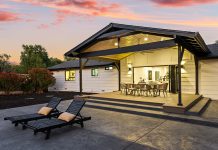Everyone needs to stop greeting each other with, “How are you doing?” or “How have you been?” Of course we care about our friends and neighbors, but these sunny day greetings just don’t fit the times right now. Let’s be honest. We’re not feeling that great. We all need to find some better ways to deal with all the depression, sadness, grief, loss and feelings of uncertainty that comes with living in the middle of a pandemic and an economic recession while we evacuate and fight wildfires for weeks and weeks. This is tough stuff. For Christ’s sake, how do you think we should be feeling?
Maybe we didn’t lose our home or have to be evacuated this time, but we all know someone who did. Most of us are COVID-19 negative so far but wearing these masks is not fun; it’s depressing. We’d cry but we don’t want our children to see us.
If we want to start feeling better, we need to do two things. We need to ask for help and, number two, we need to help others. We need to help each other cope and, fortunately, we have lots of coping tools and resources in Sonoma County that we’ve amassed from surviving four years of wildfires, a flood and a community-wide disease.
Living with all this smoke and forced social distancing overloads our emotions. We need to be our own best smoke detectors and coping mechanisms. When we smell smoke, we need to focus on facts and not fears. Our internal smoke detectors can help stop the spread of rumors and stay focused on ‘what is’ and not worry about ‘what if.’
There is a full set of coping tools at the County of Sonoma’s SoCoEmergency.org website. Included is a link to the county’s warm line for free and private help and support for dealing with emotional stress and mental health issues. The phone number is 707-565-2652 and it is operated daily from 10 a.m. to 7 p.m. None of us is too strong or macho to not use this service. The service is also available in Spanish. The county’s website also offers other mental health and wellness resources and referrals, including age-specific help, a suicide prevention helpline and a directory for physical needs around food, homelessness, COVID-19 safety reminders and support services for people with special needs.
To help each other and ourselves we need to learn what signals or behaviors to watch for. Are we getting enough sleep or too much? Are we increasing our use of tobacco or alcohol or illicit drugs? Are we able to get our work done or do we struggle with our motivation and attention span?
If we don’t deal with all these stresses, they can become physical or serious mental health problems. The first thing we must do is talk about it. Whether we get asked how we’re doing or not, we need to share our feelings out loud. We need to spend “quality time” with our friends and family (socially distanced, of course.) We should take long breaks away from social media and from images or reminders of the wildfires and disasters. During those breaks we should do a small project for ourselves or a friend. We could write a note or mail a card. (Don’t use email instead.)
There’s a different kind of coping in Sonoma County. It is Citizens Organizing to Prepare for Emergencies (COPE.) These are neighborhood watch groups that come together to identify, plan, organize, practice and spearhead projects that increase mutual emergency preparedness. The county has several organized COPE groups including for the north county, Fitch Mountain, Wohler Bridge/Westside Road, Mill Creek and others. Visit SoCoEmergency.org/prepare to find a local group to join.
Coping is not the same as living; it’s more like just existing. But if we practice enough of it, we will have a better answer when someone asks the question: “How are you doing?”









